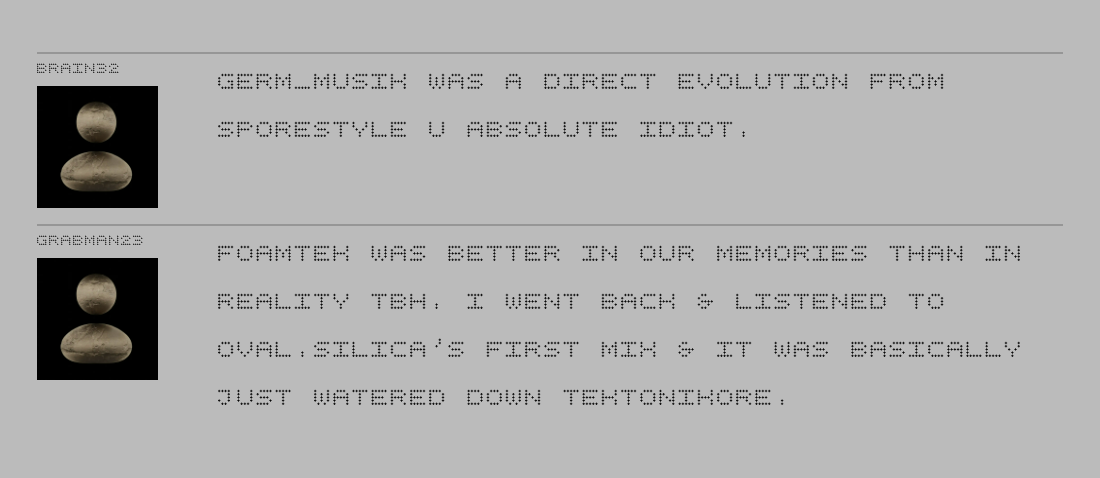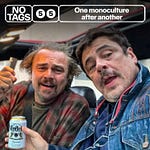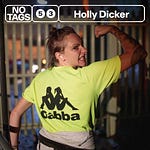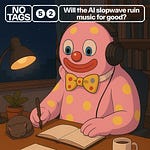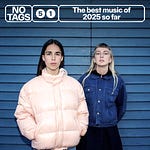As if we hadn’t gorged enough on lore last week, this time we welcome one of electronic music’s boldest world-builders, Iglooghost, fresh from the release of his new album Tidal Memory Exo.
We tend not to interview people in the middle of an album cycle – save that for the rest of the music media (we actually briefly debated No Pitches as an alternative name for this project). But Iglooghost’s work feels so relevant to the themes we regularly discuss on No Tags that it seemed like a no-brainer to get him on. And weirdly, despite the fact that Tidal Memory Exo is currently the third best album of 2024 according to Rate Your Music, we’re yet to see any new interviews with him on the traditional outlets.
We specify traditional outlets, because there’s plenty of Exo-specific content online if you’re looking for it. As he did for his previous albums, Iglooghost –AKA Seamus Malliagh – has created several websites to flesh out the imagined world in which Tidal Memory Exo takes place: a punk-dystopian vision of a British seaside town that’s been cut off from the rest of society, both offline and online. There’s a music forum where users debate the politics and micro-genres of the local “tidal scene” (sporestyle, tektonikore and other rave-adjacent sounds) and an online marketplace where people sell mysterious sea creatures called “Memrees” and offer theories about their origins, among many other diversions. It’s all connected to the Exo Portal. We seriously recommend spending an hour exploring it while you listen to the album, which came out on LUCKYME a couple of weeks ago.
Something else that interested us about the project is that while Iglooghost’s early releases (including an album and two EPs for Brainfeeder) took place in full-on fantasy world, recently he’s turned his attention to creating parallel universes based in Britain, bringing his lore-making closer to his own reality. Prior to Tidal Memory Exo, he created a whole world around “Lei Music” – a supposedly ancient musical style performed to summon “strange, squeaking entities” in rural Dorset, the part of south-west England where he grew up.
Naturally we spoke to him about all that and about lore in general, as well as getting his insights on the ever-changing nature of the online experience, his obsessive fans, TikTok as a ghost town, and the risk of world-building becoming too cynical.
As ever, if you enjoy what we’re doing on No Tags, please do follow, rate and review on your podcast app of choice, correspond with us on Substack, and consider subscribing to our paid tier. Now that we’re weekly, £5 a month works out to less than £1.20 per episode, which is basically a bag of crisps these days – and it really does help us out. Thanks for listening/reading!
Tom Lea: So first off, the Tidal Scene. What's going on in those murky waters?
Chal Ravens: Yeah, how did you discover it?
Iglooghost: About a year and a half ago I moved to this town in the south-east of England and a lot of crazy stuff happened. But long story short, there was this big glowing storm that appeared above the town, and it kind of locked it off from the rest of the country. And there's various sub-genres that started popping up [there]. I was stuck in the town, so I tried to weasel my way in to the local scene. And yeah, I've got this album that came out of that. But they're still not really into my stuff. But I'm trying. They've sort of got their own DIY, dodgy version of the internet, which is where the tunes get posted. But you can't really find it anywhere else on the internet.
Tom Lea: I want to get into the Memrees a little bit. So from what I can gather, these things wash up on the shore, it's this specific local phenomenon and there's DNA encoded them in some way. But does that code link to the music? Is the music inspired by this phenomenon? Or is it just kind of context to just what's going on there?
Iglooghost: Yeah, you'd think it'd be a bigger deal, but it's sort of just going on in the background, it doesn't really have that much effect on the music. Aside from the fact that it's the same kind of people who are making the tunes that are also the weirdos at the beach, hunting for this weird stuff. It seems like there's some weird, I don't know, DNA of prehistoric sort of angel creatures. But it's not really a big deal. It's weird to say that, but I think most people are more concerned with the scene beefs and dramas that have been happening recently here.
Tom Lea: And there are these different sub-genres, right? There's foamtek, tektonikore, germ musik, stuff like that. Does the album reflect one of those genres specifically? Or is it more of a big mish-mash of what's going on in the Tidal Scene?
Iglooghost: Yeah, I tried to incorporate all of it really. Maybe I've committed a few scene faux pas by combining certain genres that people say shouldn't be combined.
Tom Lea: Yeah, traditionalists always get upset.
Chal Ravens: What else can you tell us about the actual backdrop to this? Like the town and the geology and the weather - it feels like weather itself and natural phenomena are a really big part of the mood of this record?
Iglooghost: Yeah, I was definitely really inspired by how typically the ocean is thought of as vibrant, lively, beautiful – you know, coral reefs and all that kind of thing. But in that part of the country in the UK, the seafronts are entirely concrete, and the water is brown with, I don't know, like bad sewage treatment. People aren't even going in the water because it's too filthy, and it's generally pretty decayed. And I don't know, I just thought it was such a fun backdrop to absorb and make a record about.
Tom Lea: Yeah, a really good friend of mine lives in Ramsgate, and he's gone from swimming every single morning to never going into the sea, which is quietly terrifying.
Chal Ravens: What, because of the sewage?
Tom Lea: Yeah.
Iglooghost: I think it was because of Brexit, they now can't import some kind of chemical, or it's expensive now to import this chemical that treats the sewage. So they just pump it into the water, like, literally outside like where I was living.
Tom Lea: This whole interest in world-building, which we've obviously delved into there and has been an artery that's run through all your records pretty much, where does that originally come from? As a kid, did you play Warhammer, Dungeons & Dragons, Magic the Gathering, stuff like that?
Iglooghost: I think maybe that stuff is slightly before my time. But I've always been making... I don't really know if you can call it art if you're a kid, but I've always been busy drawing and making little models out of cardboard. And I think, in a weird way, it's always been a reflection of, at least when I was a kid, the media I was consuming.
This was the early 2000s. Maybe the people making these products caught wind of how powerful fads are, and how having this multimedia element to this stuff is... it really seems to just hijack some part of every kid's brain, me included. And I think, without knowing that, I've always been trying to reverse engineer that stuff. Which is kind of messed up in a way, because a lot of kids growing up in the time before mine, they were probably consuming beautiful children's books and amazing literature. But instead I've had to grow up on Lego websites.
Tom Lea: It's funny, I hadn't really thought about it that way. But I guess, even though in the '90s any big franchise will have a film and toys and a video game, it feels like something started to change around the time of Pokémon, where these kids' brands become so big and vast and all-encompassing.
Iglooghost: Pokémon is the elephant in the room. That really worked its way into my brain, so much so that even when my friends got a bit too old for it, I was still like, “Guys, this shit is sick - can we keep talking about it?” But it's something I think about a lot, like how much integrity all this quote-unquote lore from these toy franchises really has. Like in some ways, sure, they're just trying to sell you a lunchbox. But there's also so much detail in these weird places where there almost doesn't need to be. It's kind of art, but I dunno, at that point it's just definitions and stuff. It's a weird one.
Chal Ravens: Do you have any musical influences in terms of world-building and lore-building?
Iglooghost: It sounds a bit crazy to say, but I think the first thing that I was really a fan of as a teenager was Odd Future. The older stuff, say what you want about it, but there was definitely a lot of alter egos and implications of lore. Maybe it wasn't super fleshed out, but there was a lot more than anything else that was going on at the time. Some of it was borderline Gorillaz, kind of. I'm gonna say lore so many times in the next hour. There's got to be some synonyms I can use. [Laughter]
Chal Ravens: Welcome to No Tags! It's an interesting one, though, isn't it? Because Odd Future immediately had a very strong visual world, and a lot of the individual artists almost had their own superpowers and skills and stuff, – like Syd [tha Kyd] has her own taste world, and then you had the clothes and everything. So I think that really makes sense as a miniature universe in that way.
Tom Lea: And it had its own language as well. It reminds me of how people slightly older than us talk about discovering Wu Tang when they were kids. There's probably similarities there.
I was thinking about you making this record in a seaside town in the UK, and also the previous record being specifically about rural Dorset, where you grew up. Do you think that your art, or your approach to art at least, feeds off of isolation? If you'd grown up or spent most of your life in a bigger city, do you think that you'd be a different type of creative?
Iglooghost: Yeah, I think so. Obviously growing up in the middle of nowhere, especially when you're a teenager trying to align yourself with something that feels relevant, you're gonna be on the internet all day. I think it was growing up without any semblance of culture around me, it almost becomes lore in itself. Like, the only way I can find out about [culture] is through very exaggerated documentaries with talking heads explaining it in such an overly romanticised way that it sounds like a cheesy film. So that's very much my perception of any music stuff that happened before I was a teenager. It all just seems like fantasy.
Chal Ravens: We were thinking about how your earlier records on Brainfeeder had these influences that were more virtual, like virtual worlds that had this Japanophile slant to them. But Tidal Memory Exo and your last project, Lei Music, they both really connect to real places in England – coastal Kent, rural Dorset - which seems to bring this lore-making back into the real world. So I was wondering what might have brought you back to thinking about real places in that way?
Iglooghost: When I was a little kid I was outside a lot, but I wasn't really engaging in what was actually around me, it was more projecting images onto my surroundings, usually Pokémon or whatever. In some way it feels like a convoluted adult version of that. But something I've started thinking about more is, where's the line [when it comes to] making artwork that feels almost like a worship of these quite cynical marketing ploys, and what is essentially capitalist toy [and] video game culture? I was worried I was drifting into the wrong side of that dichotomy. That's something I think about a lot. My version of imposter syndrome is worrying that I'm a Funko Pop! enthusiast or something.
Chal Ravens: What happens to your worlds when you're not working on them? You've now got a few different concepts that are fully fleshed out with so much stuff in them, so many stories, so many pieces of artwork. When you're finished with an idea, a world if you like, do you just kind of put it on the shelf? Or does it stay present in your life in some way?
Iglooghost: Well, it's weird because I remember with the first stuff I was putting out that was catching on, the earlier stuff that was a lot more cartoony than what I've come to be regularly making... when I was a teenager making that stuff, I did kind of presume that because that was what caught on [I’d have to] continue this storyline forever. And keep rehashing it and making prequels and blah blah blah, endlessly tying up plot holes.
Chal Ravens: That's the done thing! That's what culture is.
Iglooghost: And in a fucked up way, maybe it would've been the smart business move. But there was a fork in the road where I decided maybe it's a lot more fun to just reset the room every... I hate the word era. But yeah, era.
Tom Lea: You didn't want to go full Marvel? Is that what you're saying?
Iglooghost: Yeah, that's the thing I think.
We only found this out speaking to Iglooghost after we recorded, so it’s not in the actual podcast episode – but there’s no digital trickery in this album cover [above]. He simply bought a bunch of broken second hand equipment from Facebook Marketplace and got in the sea. Full respect.
Tom Lea: I want to get back to the internet. First off, I'm curious what your formative internet experiences were, especially because the text accompanying the new album specifically mentions torrents, forums, pirated software, things that most people would see as quite archaic now. Probably in a refreshing way actually. What was your early internet diet?
Iglooghost: I think I got onto the internet a lot earlier than my friends, maybe around eight or nine years old. I definitely grew up on forums, Pokémon forums specifically. I used to run these egg adoption sites, where I'd make these little images of eggs and people would adopt them - basically just writing a weird post on a forum thread begging to have them, like, “Oh, I'm going to look after it.” Then I'd give them the link to the image so that they could put it in their forum signature, and then over the weeks, I'd come back from school and slowly hatch the egg, like it'd have cracks on it and then hatch into a guy.
Tom Lea: And this was stuff that you were drawing yourself?
Iglooghost: Yeah, just crude stuff drawn on MS Paint.
Tom Lea: You were the forum signature kid! I feel like every forum had the signature guy. That was you.
Iglooghost: Yeah. It was like a proto-NFT or something.
Chal Ravens: It sounds exactly like an NFT. Bored Eggs.
Iglooghost: Yeah, but I definitely wasn't getting anything [financial] out of it. It was just for the fun of it.
Tom Lea: There's an old interview you did with The Fader, about five or six years ago, where you talked quite positively about the idea of information overload on the internet, the feeling of having a trillion tabs open and stuff like that. You're a bit older now, but also the internet has drastically changed in the last five years. How do you feel about it now? How has your relationship with being online changed since then?
Iglooghost: It's a bit of a monkey's paw isn't it? It's maybe not as fun now, the information overload is a lot more weaponised and against your will. TikTok, YouTube Shorts, these things just seem to play whether you like them or not. I think back then I was probably referring more to how fun it was when... I mean, I guess it wasn't that different, but I think the internet felt a little bit bigger back then. It was easier to research and jump through rabbit holes and there was a little bit more of a variety of websites that were worth going through. But now everything feels a lot smaller, even just the amount of social media. It's felt really weird with this album rollout where I've just been posting on Twitter and Instagram, and nothing else really. TikTok sometimes, but even that feels strange.
Chal Ravens: In what sense, what's going on?
Iglooghost: I mean, I definitely remember with the earlier [music], I was posting on Tumblr, Facebook – it just felt like there were more communities spread out. But now, I don't know. No one will even see your posts, and everyone's on two websites or hidden in these strange Discords within Discords that are are completely inaccessible. Yeah, it all feels pretty weird.
Tom Lea: The internet should be this incredible resource where everything can live forever, but things aren't really chronicled on Discord at all. Every bit of information is wiped off the page within minutes. And I worry that the platform and these communities within it are going to leave no lasting impression and no history.
Iglooghost: I think it's the same on TikTok as well. I don't really use it that often anymore, but I was going through my likes a few days ago trying to find something and most of the videos are already broken. I don't know if it has something to do that weird record label pullout1 situation. But it's like a weird ghost town, where half the videos are silent and broken, with links that don't quite work. And it's impossible to search for anything. It feels so... I don't know, you compare that to the infrastructure of Wikipedia or something, and it doesn't even feel like it's on the internet. It's so ephemeral.
Tom Lea: On the other side of it, are there any parts of your current online diet that you do find nourishing, or refreshing?
Iglooghost: I think there's something interesting where moodboard culture2 seems to have accelerated in this rabid way. I see a lot of people complain about it. And this is particularly within visual culture, it's not really music stuff. But definitely on TikTok you see these aesthetic micro-trends. It's not a new thing but I feel like they're becoming really specific, and maybe a little bit more linked to actual knowledge of art history. And I think that's interesting. Maybe it's algorithms slowly getting more and more optimised and smarter, but it does feel amazing to see pretty young kids cataloguing folders of imagery and dividing it into cores and all that kind of stuff. It feels a lot more precise than when I was a teenager. It felt harder to do that, I don't know why. Maybe it's algorithms.
Chal Ravens: Yeah, that's interesting. You've mentioned before that you feel Instagram is insufficient for the kind of thing that you want to do online as an artist. And obviously the Exo Portal is evidence of that, because it's so rich and such a throwback to the age of forums and private communities, different ways of using a website. Have you got any thoughts on how artists, particularly independent artists can actually best make use of social media as as it is now?
Iglooghost: It's definitely fun to see people adapt to the box that it puts you in when - I'm gonna say the stupid word again - making lore and world-building. It's cool to see people try and weave around the confines. Some people might do like a little ARG [Alternate Reality Game] puzzle and have 20 profiles, and use the way that you hop between people's profiles and hashtags to uncover a puzzle or something nice. I think that's cool.
Chal Ravens: This leads me to a question I wanted to ask about your fans, who I believe are legion. Tell me about them or what you know of them. Where do they live both on and offline? And how do they interact with you?
Iglooghost: I think they mostly congregate on Discord. They're always up to no good, really. It was pretty nuts, in this album release cycle they banded together and made this bootleg Tidal Scene mixtape, which is weird because it's kind of a bootleg of a bootleg. But it's always really weird to see – I'm gonna say it again – the lore reflected back on me. It's pretty amazing, I never really know what's fact or fiction when I look through all these Discords.
Chal Ravens: So they're writing their own sporestyle tracks or whatever?
Iglooghost: Yeah, and it has weird interludes where they interview each other, there's storyline stuff, they kind of work it into my storyline but in a way that has this distance. It's pretty amazing, I think in their version of the story they've arrived in a different part of town and they're kind of watching it from afar. They've done it with every era I guess.
Tom Lea: Do your fans have a name, like Swifties?
Iglooghost: I've never thought about it... Gloo Sniffers?
Chal Ravens: Sniffers, yeah. Snifferhive.
Tom Lea: You've gone through stages of being signed to labels, first Brainfeeder and now LUCKYME, but between that you've self-released a lot. It feels like you sit outside a lot of different scenes and contexts, and in many ways you're somewhat isolated, doing your own really unique thing. So what do you want from a record label? Do you think that doing releases with different labels adds an interesting context to your music, or helps contextualise it in a different way? Or is it purely a mechanical, functional relationship?
Iglooghost: I mean, I think it's both. I'd be lying if I said I want my stuff to sit completely out of culture, and out of the conversation around music and the zeitgeist or whatever, because that's why I'm interested [in it] - I geek out about that stuff all day. It feels a bit wrong to make outsider music that's just me talking to myself. Although I take enormous liberties and I definitely make what I want, I'd like there to be a bit of a back and forth. So I do find it important to anchor myself somewhere. The worst thing for me is when I feel like my stuff gets misinterpreted and maybe put into the wrong categories. I just feel like that just changes how people see it, and that has happened in the past.
Chal Ravens: What would be the wrong category?
Iglooghost: Not to sound shady, but I've played shows in America and people have come up to me and they're like “Dude, I love your trippy video game music.” And it's like OK, this is probably my fault. At some point, I've made a misstep and it's ended up in this category. It's not what I want, it's mission failed. It's important to me that it's in the right places or aligned with the things that I like or I was referencing.
Chal Ravens: I'm intrigued about the new live show, which involves “mysterious eggs, ancient pets, toxic instruments”. It looks like there's an exciting kind of installation? And you've done some pretty ambitious stuff live before.
Iglooghost: When I when I was a wee boy, playing my first gigs, I was very much trapped behind the laptop. I think that went on for a long time, where I thought that was how electronic music was meant to be played live – some stupid sort of Guitar Hero thing where I'm pressing the pads at the right time, I don't know, it's just dumb, and at the end of the day I don't enjoy watching that sort of stuff either. So I guess over time I've started trying to get the laptop off stage and make a show that still makes sense of the project but feels big in a different kind of way. I've been playing with props and physical, theatrical stuff almost, in an attempt to fill the stage and create something that feels exciting and can't be replicated in the listening experience at home. For this show I've got this horrible calcified rocky screen that I made with my friend [experimental fashion/props designer] Yaz XL. There's some rocks that I'm gonna climb up and do a fucking backflip off.
Chal Ravens: It'd be good to hear a bit about your work with with Yaz XL. Her work is incredible, super weird and exciting. It seems like you're quite in tune actually. How did that come about?
Iglooghost: I think we just found each other, there's some weird alignment of themes [between us]. I think maybe our takes are slightly different, but there's so much where we meet in the middle. I think we're both obviously obsessed with this kind of fossilised, disgusting take on the horrible things that happen in a rock pool. It's like a perfect match.
Chal Ravens: Our final question is always the same. What film should we watch?
Iglooghost: So in Japan there's obviously Godzilla, but there's also Gamera, which is like the dodgy, bootleg, Pound Land version. Kind of like what Digimon is to Pokémon. It’s crazy. But what's even crazier is you can tell that things like Pokémon have been nicking designs out of these films as well. So there's like this endless ripoff chain. It's pretty amazing.
Tom Lea: Have you seen the recent Godzilla? Not Godzilla vs. Kong but Godzilla Minus One, the Japanese one. It's really, really good.
Iglooghost: Yeah, it's weird that they're trying to do this western version. What are they calling it, the Monster-verse or something? They're trying to run with it and turn it into horrible Marvel vibes. It's kind of gross. But then in Japan they're making really based traditional Godzilla films. They're going in the opposite direction, bringing it somewhere that's borderline art house, like on Shin Godzilla which is sick. I'll change my film actually – Shin Godzilla.
Tom Lea: I almost watched Shin Godzilla last night! That's so funny. I eventually decided I wasn't in the mood and watched Tokyo Godfathers instead, but it's definitely on my watchlist.
Chal Ravens: [Checks Letterboxd] Plot description: a gigantic creature emerges from the sea and destroys the city of Tokyo. Perfect!
Back in February, TikTok started removing videos containing music from Universal – one of the big three major labels – after failing to reach an agreement over how much TikTok should pay artists. Universal’s song catalogue is so huge that the move basically muted about 30% of song-based videos.
The prevalence of Tumblr and Instagram accounts, and more recently TikToks, which exist to repost archival images, videos, screenshots on a particular theme or ‘aesthetic’, usually uncredited. There’s a rumbling debate in art/design circles about the ethics and legitimacy of moodboard accounts. Find your aesthetic on the fandom wiki.







